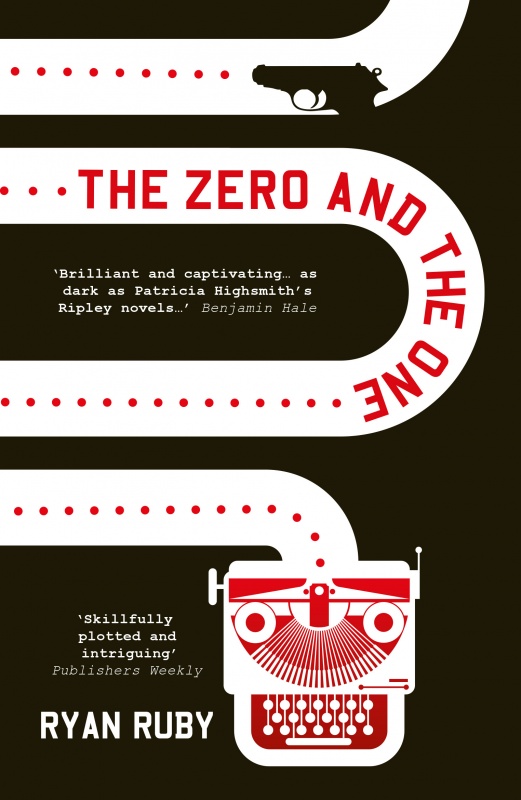Book Extract: The Zero and The One by Ryan Ruby
 Zero and The One is the latest novel from Ryan Ruby. It was released by Legend Press on 15th March. Ryan and his blog tour join me today.
Zero and The One is the latest novel from Ryan Ruby. It was released by Legend Press on 15th March. Ryan and his blog tour join me today.
A bookish scholarship student, Owen Whiting has high hopes of Oxford, only to find himself immediately out of place. Then he meets Zachary Foedern from New York. Rich and charismatic, Zach takes Owen under his wing, introducing him to a world Owen has only ever read about.
Thanks to Ryan and Legend Press, we have an extract to share with you today.
******* Start of extract.*******
RITUALS OF SUSPENSION.— The ritual that can withstand the deadening weight of its own unbroken repetition has yet to be choreographed. Any ritual so rigid that it fails to include the means of its own periodic suspension is bound to go extinct.
Pembroke is one of the smallest and poorest of Oxford’s colleges. The Cotswold stone buildings seem to turn inward, away from bustling St. Aldate’s, as if ashamed of the plainness of their features. The Old Quad, where I was given rooms, lies quite literally in the shadow of the fairer sister over the road. Tourists would come from round the world to visit Pembroke Square, only to turn their backs on our Porter’s Lodge so they could have a better angle from which to snap a photograph of Tom Tower, the lavishly ornamented gateway to Christ Church.
The college was old enough to have produced a few notable alumni, but the most famous of them, Samuel Johnson, was sent down after a year for a lack of funds. Today, its students are better known for the speed of their oars on the Isis than the speed of their pens in the Exam Schools. It is largely made up of those like me, who have what the Student Union euphemistically calls non-traditional backgrounds, and who were only able to attend the oldest university in England by grace of what the Bursar called, rather less euphemistically, hardship grants. (Mine in particular were nanced by the sale, a few years previously, of Man in a Chair, an early painting by Francis Bacon, a poster of which was the only decoration on the walls of my rooms.) Rounding out the Junior Common Room were the thicker products of the public schools, Erasmus scholars from the continent, and Americans on their year abroad.
Of this last group there were around twenty, paying American tuition fees to add English polish to their CVs. The reason for their presence at Pembroke was nakedly economic, a way for a college whose endowment consisted almost entirely of subsidies from its wealthier neighbours to generate a bit of additional revenue. They were lodged in the back staircases of the North Quad, on the main site, with the rest of us first years. Though they were only two years older than I, and though they were living, many for the first time, in a country not their own, this slight difference in age lent them an air of cosmopolitan sophistication; I certainly wasn’t the only one to regard the visiting students, as they were called, more as elders than as peers. For better or worse, they generally had the run of the place.
 Zach was not long in distinguishing himself, mostly through skirmishes with various members of the college staff concerning the finer points of college etiquette. The first time I recall seeing him, he was being reprimanded by Richard Hughes, the Head Porter, a lean and sallow-faced man in his fifties, whose fingernails were worn longer than his sense of humour. I remember looking out my window to see what the fuss was about below. Zach, it seems, had walked across the immaculate square of lawn in the Old Quad on his way to the pantry. Not content to defer to authority — or local custom — he was demanding, in those at syllables I’d come to know so well, the explanation for such an absurd rule. The one he was given (“only fellows and newlyweds are permitted to walk on the lawn of the Old Quad”) didn’t satisfy him. He demanded another. The exasperated Head Porter told him that it was “out of respect for the sleep of the dead monks who are buried there.” To this he nodded, convinced and perhaps a tad impressed. But whenever he walked through the Old Quad, he made sure to toe the cobblestones near the edge of the lawn, not seeming to care, now that he had been reprimanded, that he was liable to pay a ne if he lost his balance.
Zach was not long in distinguishing himself, mostly through skirmishes with various members of the college staff concerning the finer points of college etiquette. The first time I recall seeing him, he was being reprimanded by Richard Hughes, the Head Porter, a lean and sallow-faced man in his fifties, whose fingernails were worn longer than his sense of humour. I remember looking out my window to see what the fuss was about below. Zach, it seems, had walked across the immaculate square of lawn in the Old Quad on his way to the pantry. Not content to defer to authority — or local custom — he was demanding, in those at syllables I’d come to know so well, the explanation for such an absurd rule. The one he was given (“only fellows and newlyweds are permitted to walk on the lawn of the Old Quad”) didn’t satisfy him. He demanded another. The exasperated Head Porter told him that it was “out of respect for the sleep of the dead monks who are buried there.” To this he nodded, convinced and perhaps a tad impressed. But whenever he walked through the Old Quad, he made sure to toe the cobblestones near the edge of the lawn, not seeming to care, now that he had been reprimanded, that he was liable to pay a ne if he lost his balance.
A fortnight later, I was sitting alone at what had already become my regular seat at my regular table, reading whilst I waited for Formal Hall to begin. I was dressed subfusc— jacket, white bowtie (in my case poorly knotted), black commoner’s gown— the requisite attire. Zach arrived in the company of Gregory Glass, in the middle of a heated political debate.
“I can’t believe what I’m hearing!” Gregory was saying. The other visiting student from Columbia, Gregory was short and barrel-chested, with long curly brown hair that was held off his face, no matter what time of day, by a sporty pair of sunglasses. I’d already seen him several times at macroeconomics lectures, furiously scribbling away in the front row. That term, not a single lecture would conclude without Gregory raising his hand to ask a question, or rather, to give a meandering observation in an interrogative tone.
He asked me if they could sit at my table and, without waiting to hear my answer, continued talking to his friend. “Don’t tell me,” he said, in a voice that could be heard from one end of the hall to the other, “you’re going to throw your vote away on Nader!”
“I’m not throwing away my vote,” Zach replied, perfectly calm.
“I’m not voting.”
“But it’s your duty to vote! You complain about the government all the time, but when you’re given the chance to actually change things, you throw it—”
“See, that’s where you’re wrong. My vote doesn’t actually change anything. Nor does yours, Greg. You and I are registered in states that have already pledged their electors to Gore. And anyway, on the major issues there is a consensus between the two parties that differs only in rhetorical emphasis. During the presidential debates, the questions are never How should we organize our economy? but What avor of capitalism would you like? Never What role should the United States have in the world? but How blatant should we be about our empire? Third-party candidates like Nader, who at least would give the election the veneer of choice, are marginalized into irrelevance by unregulated campaign finance laws and” — here he pointed a finger at Gregory — “the bad-faith scare tactics of pseudo-leftists and lesser-evil socialists like you.”
Fuming, Gregory tried to respond to this accusation, but Zach sped to his next point before he could get a word in. “So don’t tell me it’s my duty to accept this state of affairs. It’s not my duty to give legitimacy to this farce we call democracy. Under the present conditions, voting is one of those customs more honored in the breach than the observance.”
Gregory looked like he was going to lean across the table and grab Zach by the bowtie to get him to stop talking. To make sure he wouldn’t be interrupted again, he almost shouted his rejoinder. “Man, you’re so full of shit! I’d rather be a ‘pseudo-leftist’ than the beautiful soul who’s scared to get his hands dirty in actual politics. You think of yourself as a purist, but you’re just a cynic with a trust fund. You talk about not being able to opt out of capitalism? Why would you even want to? You’re its beneficiary! I’ve never met anyone more bourgeois than you.”
“As Marx de ned bourgeois, maybe,” Zach said, with a dismissive twirl of his wrist. “But not as Flaubert de ned it. Speaking of cynicism, Comrade Glass, let’s say for the sake of discussion that your socialist dream is realized on earth. Poverty is eradicated, exploitation rooted out, war declared a thing of the past, and total freedom of thought is granted to all. That’s the idea, right? Now, will mankind hunt in the morning, sh in the afternoon, raise cattle in the evening, and criticize after dinner, as Marx predicted?” he asked, counting off each activity on his fingers before answering his own question. “No! They’ll shop in the morning, ll their prescriptions in the afternoon, watch TV in the evening, and die of boredom after dinner! Stupidity is not just the result of false consciousness and organized oppression. It’s the natural condition of the vast majority of mankind. It’s the one thing that is equally distributed among the rich and the poor. Solving our political and economic problems will do nothing to answer the question, Why bother? In fact, all evidence suggests that it will only make that question more difficult to answer.”
Meanwhile, the hall had filled up with students and the fellows of the college had taken their places at the High Table. In a slow roll, the current of conversation ebbed and the hall flooded with the sound of bustling chairs as we all stood to hear the Classics Tutor recite the Latin Grace. All save Zach, that is, who remained seated. He took the opportunity to slide my book close enough to him to get a better view of the cover. He tapped the title with two fingers — I was reading The Birth of Tragedy — and nodded with approval. Grace concluded, the sound of conversation and sliding chairs and clanking cutlery resumed. The waiting staff appeared and began to place the starters on our plates.
Gregory returned to his seat and gave Zach a stern look.
“I bet you were the kid in homeroom who refused to stand for the Pledge of Allegiance.”
“We didn’t have homeroom at The Gansevoort School, Greg.”
The Hall Manager had also noticed the sole seated student and went to enquire into this breach of conduct. The Hall Manager was called Mr. Stroop, a squat man well past middle age, whom I couldn’t stand. Stroop had worked at Pembroke for over a decade, but was far less convincing than the Head Porter in performing his role as the guardian of the college’s traditions and values. It was precisely in his comical assiduousness that he betrayed his working-class origins. No one who belonged at Oxford, who was slated to go there from birth, from before their birth, cared half so much for the college’s traditions and values as he did. This confounded and perplexed him, but as he did not understand why it was the case, he was undeterred in his mission. Queuing up at the pantry one day, I heard him correct the pronunciation of an American who had ordered his sandwich without tomato. “It’s toh-mah-toe,” he said. “Not toh-may-toe. You’ve come all this way to receive a proper education. You should at least learn how to order a sandwich.” A proper education. One he himself had not received. A fact that was not lost on the American, who sneered at this bit of servility and told him to bring the sandwich “without toh-mah-toe. Right quick!” Which Stroop did, causing me to wince.
Implying he couldn’t hear what was being said over the general din, though he must have known quite well what the Hall Manager was there to discuss, Zach motioned him closer to his ear. Stroop stooped as he was told and the whole table quieted down to listen to what promised to be a duel of insincere politeness.
“Mr. Foedern —”
“How may I be of help, sir?”
“I couldn’t help but notice that you — and you alone — were not standing during the recitation of Grace.”
“Yes, sir, you’ll have to forgive me. You see, I don’t speak Latin.”
“Don’t speak Latin? I’m afraid I don’t see what that’s got to do with it.”
“I’ll explain. To stand means to assent, no?”
“To stand? Yes, I reckon…”
“Well, there you have it. I can’t assent if I don’t understand what’s being said. And I can’t stand if I don’t assent. So perhaps you’ll be so good as to translate the Grace for me so I can decide whether I assent or not.”
Zach batted his eyelashes with feigned innocence and, receiving no response from the flustered Hall Manager — whose only Latin, needless to say, was Veni vidi vici and Dominus illuminatio mea — tucked into his prawns. Mr. Stroop interrupted him to escort him to the High Table so the Classics Tutor could translate the Grace for him. I watched Zach listen gravely, exchange a few words with Stroop, and return to his place at the table. But he did not sit down. He poured himself another glass of wine and drank it in a single swallow.
“Now that I understand,” he told us, “I definitely do not assent.”
“Where are you going?” Gregory demanded.
“To Hassan’s,” Zach said, referring to the kebab van on Broad Street. “I’m sure they will agree with my position on the Latin Grace.”
I never again saw Zach attend Formal Hall, but I noticed that during every subsequent Grace, one or two students remained seated, small acts of rebellion that would plague Mr. Stroop until the end of the year.
******* End of extract.*******
 About Ryan:
About Ryan:
Ryan Ruby is a writer and translator from Los Angeles, California. His fiction and criticism have appeared in Conjunctions, The Baffler, Dissent, n+1, The Paris Review Daily, and elsewhere.
His debut novel The Zero and the One was published in March 2017.
A graduate of Columbia University and the University of Chicago, he lives in Berlin, where he is on the faculty of the Berlin Writers’ Workshop.
For more information on Ryan, visit his website: http://www.ryanruby.info/fiction/





Leave a Reply